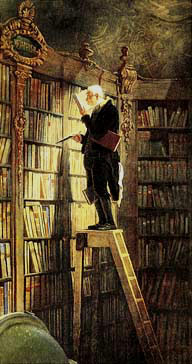
Karl Spitzweg, "The Bookworm"
Introduction to Sociology - Online
Reading Assignments, Lecture Notes, Videos & Web Sites
Unit 9: Deviance and Crime in America
Readings:
Macionis, Society: The Basics, chapter 7 ("Deviance")
Kim Parker, Juliana Menasce Horowitz, Ruth Igielnik, Baxter Oliphant and Anna Brown, "America’s Complex Relationship With Guns: An in-depth look at the attitudes and experiences of U.S. adults," Pew Research Center, Social & Demographic Trends, June 22, 2017
Ruth Igielnik and Anna Brown, "Key takeaways on Americans’ views of guns and gun ownership,"Pew Research Center, Fact Tank, June 22, 2017
Pew Research Center for the People and the Press, "In Gun Control Debate, Several Options Draw Majority Support" January 14, 2013
Howard Schuman and Stanley Presser, "The Gun Control Paradox," Context, Spring 2013
Devon W. Carbado, Cheryl I. Harris, and Kimberlee Williams Crenshaw, "Racial Profiling Lives On," New York Times, August 14, 2012
Rich Morin and Renee Stepler, "The Racial Confidence Gap in Police Performance: Blacks, whites also have dramatically different views on causes of fatal encounters between blacks and police," Pew Research Center, Social & Demographic Trends, September 29, 2016
Karen Sternheimer, "Why Do Perceptions of Police Vary?" Everyday Sociology, July 10, 2017
Death Penalty Information Center, Facts About the Death Penalty
Jeanne Whalen, Devlin Barrett and Peter Loftus, "Glaxo in $3 Billion Settlement," Wall Street Journal, July 3, 2012
Russell Mokhiber, "Top 100 Corporate Crime Stories of 2011"
Mark Berman, "Former coal CEO sentenced to a year in prison after 2010 West Virginia coal mine disaster," The Washington Post, April 6, 2016
Listen to the following interviews:
Michelle Alexander, The New Jim Crow: Mass Incarceration in the Age of Colorblindness, National Public Radio, January 16, 2012
Douglas Hartmann on Midnight Basketball
In this episode, I talk to University of Minnesota Professor and Editor-In-Chief of The Society Pages Douglas Hartmann about his book Midnight Basketball: Race, Sports, and Neoliberal Social Policy. This conversation focuses on a 1990s crime initiative, known as midnight basketball, which aimed to curb crime by setting up late night basketball leagues in inner cities. While initially popular with democrats and republicans , including president George H. W. Bush, the program would eventually fall, being attacked by right-wing politicians and radio hosts alike, but it left behind a complex history with many implications for sports, race, and social policy today. November 21,Visit the Following Web Sites:
(1) The Innocence Project - Use the drop-down menu for "Understanding Causes" located across the top of the page, read each section and view the brief videos.
(2) The Central Park Five - Read the Overview and then click on 'Watch Videos" located across the top of the page. Watch "Central Park Five Trailer" and "Central Park Five Overview."
(3) “Death Penalty” at ProCon.org - Read the following Pro-Con sections: Does the Death Penalty Deter Crime?, Does a Person's Income Level Affect the Likelihood of Him/Her Receiving the Death Penalty?, and Does a Person's Race Affect the Likelihood of Him/Her Receiving the Death Penalty?
(4) Philip Zimbardo: The Stanford Prison Experiment - Go through the slide show
(5) Corporate Crime Reporter: Top 100 Corporate Criminals of the Decade - Read the Introduction and then count how many of the top 100 Corporate Criminals of the 1990s you recognize.
(6) Corporate Crime Reporter: The Case for a Corporate Homicide Law